#from what i'm understanding: the nuance of the 'evil/heinous' is
Explore tagged Tumblr posts
Note
Hi! If you don't mind me asking:
What does mxtx says about jc's character? Like some jc stans claim that she has said he has a knife tounge and tofu heart, (I don't believe it still) is it true? I don't know where to find her interviews, so I asked you instead:)
Thank you 💕
MXTX speaks on Jiang Cheng’s character in two places that I know: the old version of the postscript of the novel (absent from the official 7seas release) and an interview from before she left socials.
In the postscript, she only has this to say about Jiang Cheng:
Everyone should know what Jiang Cheng’s keyword is without me saying it. In the beginning, I thought with with XY’s [Xue Yang] existence, Jiang Cheng’s negative energy would definitely seem skimpy. Who knew he became the ultimate superstar of the comment section? Compared to him, XY was almost a poor, has-been idol. Only now and then would someone decide to drag him out again. Of course, in the end, under the combined PDA attacks of WWX and LWJ, the past and present superstars were obliterated.
And in this interview, she goes more in-depth. Sidenote: while I appreciate the interview for what it, I do not appreciate the ways in which they insert their own opinions about how they think MXTX should feel about Jiang Cheng into the actual interview commentary, and it shows how much of a bias even the interviewer had towards his character to have asked so many leading questions in an attempt to get a positive response out of her about him.
Anyways, here's some expansion by @jiangwanyinscatmom on the nuance of what mxtx meant by “not heinous/evil” that was lost in translation here and some more re-translation (still of the same interview as above):
墨香铜臭:本性不是特别坏,但是有人要讨厌他的话,那也没办法。因为你讨不讨厌一个人,也是……也是自己的问题。
He is not a 坏 (basically spoiled broken, corrupt) person by nature, but if someone wants to dislike him, there is nothing I can do about it. Because whether you dislike someone or not is also... your own choice.
MXTX's answer about why Jiang Cheng never could marry and how she sees him as a character (parenthesis section for jiangwanyinscatmom's own translation notes):
墨香铜臭:就性格比较差劲吧,谈了几个,吹了。 (He just has an 差劲 (average/lame/disappointing, let down) temperament, he dated several times but they were all failures) 墨香铜臭:我眼中的江澄……我眼中的江澄,就……其实没怎么样,我写文还是比较客观的。我看他……我看他就、就像是在看一个作品。 女主持:如果让大大本人来介绍江澄这个人的话,你会怎么介绍他? 墨香铜臭:我觉得他是一个负能量比较……重……的人。 女主持:这么简单吗? 墨香铜臭:对,负能量比较重,但是也不是个、也不是个十恶不赦的人吧。对。 MXTX: In my eyes, Jiang Cheng... In my eyes, Jiang Cheng is... Actually, it's nothing special. I am relatively objective when writing. When I look at him... When I look at him, it's like looking at a work of art. Female host: If you were to introduce Jiang Cheng, how would you introduce him? MXTX: I think he is a person with a lot of negative energy... Female host: Is it that simple? MXTX: Yes, he has a lot of negative energy, but he is not a heinous person. Yes.
In short: MXTX describes Jiang Cheng as a character that is filled with negativity and unable to date, but he is not inherently evil nor to the point of being irredeemable. He is a product of the story and fulfills the role he was created to fulfill in the plot. He's not a good person, not overtly and not secretly. That's it.
#mxtx asks#mdzs asks#anon#from what i'm understanding: the nuance of the 'evil/heinous' is#the difference between a schoolyard bully and cecil rhodes#yeah a schoolyard bully is a terrible person and their victims will likely never want to forgive them or befriend them in this life#but that is NOT AT ALL on the same level of what cecil rhodes did#interpersonal jackassery vs. societal-level crimes against humanity#(though i think the people of yunmeng would beg to differ about jc's crimes only happening on the 'interpersonal level' but i digress)#canon jiang cheng#jiang cheng
67 notes
·
View notes
Note
some of these people are a little silly when it comes to this Snape hatred thing. There is a reason that there is a such thing as a reformed white supremacist, one who grew up like that but not anymore. (Derek Black, Tony McAleer, Christian Picciolini) People can have epiphanies about their beliefs and change them. There are plenty of activists who used to have Anti-... views but have figured out that their views were wrong. Being groomed into the system, you need to account for why a person would feel the need to do that. Going into a gang, for example, to protect yourself or your family/friends/etc. Would this be something you would do no matter what? No. There is always nuance and it is really detrimental to simply say, well but he was a racist. Okay, why though? No one is born anything. The fact that he was able to take a look at himself, regardless of the reasoning and change his viewpoint is something that is really nice actually. Also the Marauders gang and their 'pranks.' The one prank that we got to see is idk pretty evil, and for this I'm thinking of the books not the movies since I remember the former better. The nuance of the good guys bullying someone would probably make that person go more down that rabbit hole. A cornered animal bites, just like a cornered human will twist and claw at any chance to get out of the situation. Add in an ego that is actually very common for guys (in terms of not wanting to be saved by a girl of all things), and you have Snape saying a slur to the girl he likes. Objectively bad, but again with nuance. People need to not be taking things at face value I fear, its the same kind of energy that would have us without a self-defense exception and treating all types of murder the same, 1st degree to involuntary
This is one of the main reasons why I don’t like or believe in the validity of a jury trial, because jurors lack legal knowledge and tend to view things without a clear perspective.
First, as you said, a crime is not just a crime. Not all crimes are the same, nor do they have the same level of severity, and they cannot be judged legally or ethically in the same way. There are aggravating and mitigating factors based on intent, cruelty, mental state, and the individual’s context. Manslaughter is not the same as premeditated murder or incitement to homicide. Theft is not the same as robbery or armed robbery. Belonging to a terrorist group is not the same as committing a terrorist act. These are different things and must be judged accordingly.
In Snape’s case, he joined a terrorist group but became an informant for the “good side,” which, in a real-world legal context, would likely exonerate him from previous crimes. Even people who have committed heinous crimes and murders receive deals from governments if they become informants during wars. Beyond that, the worst thing he did was insult someone. We could argue hate crime, but in court, I would claim his prejudices stem from trauma caused by his abusive Muggle father and his upbringing in extreme Muggle poverty. I would request a psychiatric evaluation from state-appointed experts to confirm that not only are his potential biases rooted in trauma, but also that he shows signs of antisocial behavior and emotional and cognitive underdevelopment due to years of abuse and bullying at school. This would be a strong defense in any trial, making prison time unlikely with a judge. If a jury convicts him due to bias and a lack of understanding of how the legal system works, that’s not my problem.
Honestly, I judge James more harshly than Snape because James had no reason to be a bully or an awful person. He had everything, including a loving and caring upbringing. Nothing in his life was violent. No one taught him that violence was acceptable (unlike Sirius, for example), and yet he still engaged in it. I can understand children struggling to distinguish between right and wrong when their role models have been dysfunctional, but I can’t forgive a boy who had everything — including supportive parental figures — and still turned out to be a sociopath. The only explanation for his behavior, in my opinion, is that he was simply a terrible person who enjoyed causing pain and exerting power over others.
#severus snape#pro severus snape#pro snape#severus snape defense#severus snape fandom#james potter#harry potter meta
23 notes
·
View notes
Note
Could we maybe get an analysis on her “stop making villains like Magneto, they suck” video?
Also, I for one am sat patiently for that Flowers In The Attic analysis.
FItA Lorch Analysis coming next.
For right now: Part 3, Final round. FIGHT!
[Part 1] [Part 2]
Lily Commits Elder Gay Mutant Abuse, feat. "Eldritch Lily" (Part 3)

8:30: "And making these characters hop in the giant death robot so they can randomly do some heinous act of evil so you feel less guilty for wanting to bring them down is very telling about your priorities as a writer." [We're still talking about Korra, for context.]
I'm highlighting this quote more than anything as a means to really dig into the big stink with Lily's media analysis here. I've said something along the lines of, "I kind of agree with her, but not actually," several times while writing this, and this is exactly why.
I think a lot of people come at media criticism from a very flawed position because of the way the grading works in our school systems, of all things. They judge it like there is the possibility of getting an A+ on your show, movie, novel, video game, etc. For the purpose of reviews, as a quick way to indicate quality/how much you recommend a piece of media, I understand why critics would use scoring systems like that-- but when it comes to analysis, that's not really a useful approach. There are technical skills and proficiencies in execution that you can grade media on like that, but even they have their nuances. Conceptual ideas presented in media, however? No dice.
There are certain filmmakers in particular who I fully acknowledged are very skilled at their craft-- I still strongly dislike their films. I don't agree with the conceptual ideas they have to present, and I don't think they convincingly rationalize their position textually, subtextually, or otherwise. With that said: I think most media produced, regardless of quality, is a net positive for the intellectual landscape of humanity as a whole. With the exception of media that is actively harmful in a very direct way, disingenuous propaganda, or particularly egregious cases of cooperate slop, I support any creative's ability to add to the long-form conversation art and creation offers. Those highly proficient filmmakers I ideologically disagree with, their ability to articulate their worldview so genuinely, and clearly helped me as a creative articulate why I disagree.
With all that said, it's clear Lily doesn't think in that regard. Lily has taken media crit she has heard from other sources. She has just retrofitted it to whichever property she wants to rip into. If it superficially applies enough that she can misrepresent a piece of fiction with an argument, she will apply it across the broad. Approaching media crit like there is a definitive way to "score" fiction on its conceptual value, like it's a high schooler's end of term essay. Context be damned.
What she is articulating here is a valid criticism of certain fictions that try to present morally complex villains. This is a complaint I've made myself over properties like the first Black Panther film (which, thankfully, they at least did their best to rectify in the second). But not Kuvira. Not Magneto as a whole.

9:07: "Which would have been interesting, and led to some criticism of the main characters for trying to restore the same monarchy that has previously failed the people."
They weren't trying to restore the monarchy. They were protecting the prince from assassination. I feel like it'd be pretty tyrannical of the Avatar to say, "fuck you Earth Kingdom, you don't get your royal family anymore," without their say, Lily . . .
9:18: "Maybe talk about the United Republic being a literal concurred settler state."
YET AGAIN LILY'S CRITICISM BOILS DOWN TO, "I HAVE NEVER READ A COMIC."
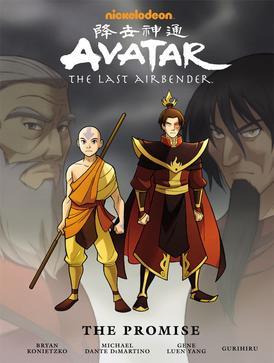
9:30: [Lily takes like, the 12th bullshit pot shot at the creators of Avatar.]
I've ignored it up until this point. There's been too much else to talk about. But Lily has assumed an absurd amount about the authorial intent of everyone she's discussed in this video-- including Jack Kurby's intent when creating Magneto.

9:40: Lily fumbles through some final point here with two sentences that make no sense when put together about how this is all people doing tropes badly, but if you did it well then the trope wouldn't exist and aaaaaaaaaaaaa.
God please strike me down.

10:10: Lily calls this all propaganda.
Again. She's sort of right in the abstract, divorced from the content of her video. Wrong when taken in context of what she's talking about. SOMETIMES "sympathetic villains" are used as political propaganda. Sometimes, they're a legitimate expression of a creator's misunderstanding or mischaracterization of an ideology. Sometimes, they're an earnest dissection of the ideological concept.
Good argument of specific pieces of media, retrofitted, flattened of any nuance, used to discredit a thing Lily doesn't like across the board.
We're in a timeloop.
10:25:
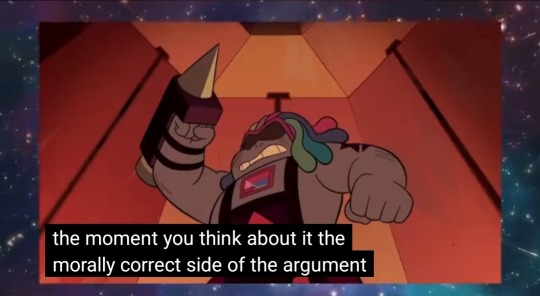
God is dead and we have killed him.
11:01: "The problem is that this idea of all villainy being nuanced and complicated has just never really been true. Evil people in real life will often just invent justification for evil things they already want to do. And there's a point where someone crosses the line of evil so much that nothing they say earns them sympathy."
Lily thinks people commit acts of extreme violence and atrocity for . . . Fun, I guess. Disturbingly enough, this tracks real well with how she's justified her own abhorrent actions in the past. When other people do bad things, it's because they like it and are bad. When she does a bad thing, she has a reason, and therefore, it's justified. Another self-tell Lillian.

11:42: "The problem with my idea for these kinds of villains is that they inherently make white people of any gender uncomfortable."

GOD FINALLY FUCKING DONE THIS GOD FORSAKEN VIDEO AAAAAAAAAAAAAAAAAAAAAAAAAAAAAAAAAAAAAAAA.

Pray for me, the fucking psychic damage I just fucking took for you guys.
I suppose the only take away here is this:
The thing that's so exhausting about Lily's videos is the complexity of the degrees in which she is wrong. She's developed, for lack of a better word, a talent for laundering good arguments in a very disingenuous fashion. I wouldn't go so far as to call what she does plagiarism. Her work is more than just stealing other people's arguments and regurgitating them back-- but what she does is a spiritual cousin of sorts.
She bootlegs intellectualism to sharpen it into a shiv she can use to stab at anything that displeases her. The same way she weaponizes her marginalized identity, she weaponizes honest and thoughtful media analysis aswell.
This video was, frankly, barely even about Magneto. Barely even about sympathetic villains. She has no interest in the material that was the topic of this video-- not even enough to do a bare-bones Google search beyond looking up vague facts she could massage into supporting her claims.
A lot of those very early X-Men comics are fucking rough. They include shit like Charles expressing some very creepy thoughts about a (I believe then) teenage Gene Grey. Some very yikes dynamics with the then mostly/arguably entirely white mutants acting out very on-the-nose imagery associated at the time with the black liberation movement. And some very questionable framing and dynamics due to the fact that, real life marginalized groups typically don't have dangerous superpowers.
However, you can almost sense the moment when Kurby started to take the reigns and make the X-Men into something really special. Not to imply that Stan Lee is a bigot or a bad writer, he had very good intentions. By his own admission, he did his best work as a collaboration with his artists guiding the story along with him (sometimes, well, functionally being the actual writer, no offense, Lee left a bit of a complicated legacy, we can't get into it right now.) Anyone familiar with Kurby's work as a whole will know just how profoundly humanist he was with the stories he told.
Despite what Lily arrogantly implied here, he always intended Erik to be a very sympathetic character. Even as a "villain," a sympathetic character vaguely coded as an "extremist" black activist was kind of bold for the 1960s. I can't tell you for certain what ol' Jack's authorial intent was, the man very rudely died 3 years before I was born so I never really got the chance to ask him-- but dare I say this was his best attempt at laundering the idea that maybe "radical" activists actually maybe had a point? To an audience who would have been VERY against that idea if presented to them outright at the time? Even now?
Media does have the power to shift cultural perception-- even if that takes time. In the early 2000s, when I was taught about Malcome X for the first time as a child, even then, 40-some-odd-years later he was presented to me in a negative light. It was in the context of him being the inspiration for Magneto, however. The emotional connection I had to that character made me question whether that characterization of Malcome was entirely fair-- even though I was too young and didn't have the full context to grasp what I was being told at the time. I do believe to some extent that Magneto's popculture relevance has helped preserve the legacy of some of the more controversial activists in history. By being a figure people can personally connect with. Of course, it's all more complicated and messy than I'm making it sound, however. It's unfortunately very easy to flanderize figures of history, boil down their motives, and flatten their narratives. A character in a story, detached from any direct sociopolitical baggage, is something you can form a bond with. Something that can (if handled properly) promote empathy for their real-life equivalents.
There absolutely is a conversation to be had about certain ideologies or positions being more often than not, for practical or political purposes, cast in the antagonistic role in fiction. However, Lily's thesis here, boiled down to the bones, has been disproven ten times over by the abject failure of shit like The Comic's Code Authority and The Hays Code. People don't emotionally connect with squeaky clean moral paragons as much as they do messy, complicated, emotionally challenging complex characters-- even when you paint them as the abject villain of the story.
People fucking adore Magneto. He's a cultural icon. Even before the FoX-Men movies came out, he was probably one of the few comicbook characters your mom could name. Vaguely recognize, at the least. And yes, that doesn't always translate into people being charitable to "radical" civil rights activists in real life-- but doesn't necessarily harm it either. Anecdotally, it helps, if but just a smidgen.
Anyway, get fucked Lily. Magnet Daddy FTW.
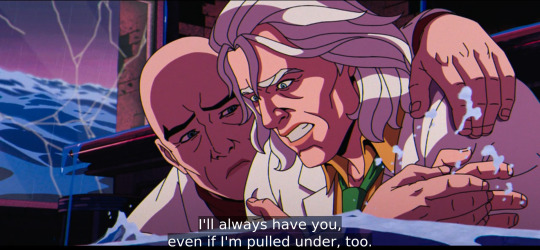
P.S. X-Men '97 is really good. Also, it's 100% alluding to these two having fucked. Maybe outright confirmed it by now, I'm not totally caught up.
I mean, we all already knew they totally were lovers, but.
Come on Disney, give the people what they want. Make 'em kiss. These poor old men have been having sexual tension for like, 60 years.
#lily orchard#lily orchard critical#anti lily orchard#lily peet#lily orchard stuff#lorch posting#youtube#liquid orcard#x men#magneto#fox xmen#x men 97#media#media criticism#marvel#comic books#comics#lily orchard is a bad critic#eldritch lily#lily orchard discourse
17 notes
·
View notes
Note
you can talk for hours about philosophy? try me.
@everydayarsonist Oh boy, can I talk on this, but please remember that these are just my personal opinions based on MY experiences. These topics are very subjective, and while I do have strong feelings about this, in the end I won’t hold it against anyone who disagrees with me. I haven’t lived your life.
- Peace and love, Silver/Quiet-Art-Kid
I find the concept of hell horrific because it feels excessive. Firstly, I think you have two types of “bad” people. Bad people who had a choice and those who didn’t (or at least less of a choice). This is a simplification for the sake of time, but if a god made a person with really-wants-to-murder-people disease and then they murder someone, I would argue that most of the blame, not all but most, falls on the god seeing as how the person was given an unfair hand from the start. However, then there are the average people who commit atrocities, but ordinary people with no mental health issues don’t commit atrocities for fun. They have reasons, selfish or noble. They aren’t doing horrible things because they like the feeling of being evil. There have been many accounts of horrible people turning their lives around, so why is there a hard line when you die? I also don’t like the concept of a "forever" hell. We will talk about the seeming social need to punish people later, but for now, let's say that people who have committed the most horrible crimes do need to be punished; forever still seems excessive. Morally I’d still be iffy on it, but I’d be more fine if it was a thousand years maybe even a million, but FOREVER is unfair no matter what the crime was, and that is a hill that I will die on.
I said I'd be going back to punishment, and I am. I personally believe in reparations more than making the other person pay. I believe in the death penalty only in 2 circumstances. Firstly, this is for emergencies only if the nation quite literally cannot afford to keep a living prisoner. For first-world countries, this is not a problem. They can afford to keep people alive. Secondly, it is when they are a serious threat to everyone around and cannot be helped despite efforts. This one I'm still a bit iffy on, but I do understand it.
Speaking of punishment I have a neat thought experiment. There is a person. They committed all of THE MOST HEINOUS, HORRIBLE acts a human possibly can MANY MANY times. You have the power to punish them however you please. HOWEVER, all the victims are perfectly okay now, like it never happened. The person in question will never do any of those things again; this is guaranteed, and whatever you choose to do to them doesn’t influence anyone else's life choices. What do you do?
In my opinion, JUST MY OPINION, mercy is the right choice logically. No people are currently hurt; why increase that number? but it still feels wrong emotionally, and I’m guessing that is because of the society I was raised in and am inevitably a part of tends to view things from an eye for an eye perspective.
I do want to clarify that I recognize that there is nuance in punishment, and, to an extent, it is useful and necessary.
Another neat hell concept to explore would be the potential of people working together. Even though, if it exists, hell houses the worst of the worst, people are still people. Humans are resilient as shit, and in hell you can’t die and you have nothing but time. Even the worst of the worst humans are still human. I can see some small communities forming in the worst place ever to work together to make it slightly less miserable.
I was also born with the unique gift of being able to have an existential crisis no matter what happens after death.
A: there is nothing forever. That is so terrifying to me to my core. I really don't get how people can just be ok with the concept of not being
B: there is an infinite afterlife: eventually all stories will be told, all will be learned, and there will be nothing left to get excited about. Maybe it won't happen for a googloplex to the power of googloplex years but that is still not even a drop in FOREVER.
C: reincarnation: I personally don't like the idea of going through life start to finish again and again and again forever and never remembering.
D (honorable mention): When I was a little girl in Sunday school, we learned about heaven. I asked a question about what you can do in heaven. Can your spirit still lift objects? Can you still run, play, etc.? This question probably caught the teacher off guard, and she said, no you just kinda hand out in the glory of God floating. This made a little pit in my stomach, and I remembered being scared of dying and going to heaven for the first time. I was a very active child, dancing, crafting, writing, drawing. It felt like I would be trapped with just my thoughts and nothing to do. That felt closer to a hell than a heaven.
No matter what happens, one thing is for sure: I am terrified, and I will never not be
Something else I’ve noticed is a lot of people use if something is icky or not to determine their morality. For example when people say “Kill all pedophiles” what people mean is kill all child abusers. Pedophilia is a paraphilia; it is outside of people's control. Yes some pedophiles abuse children, and that is horrible, but people who don't meet the criteria of being a pedophile ALSO do that. This might just be me, but I don't believe in thought crime, even if the thoughts are abhorrent; once it turns into action, it becomes a crime, and only then.
People hate on so many things just because they are “gross”. And this might not be true everywhere, but what I've noticed from my world lens is that this applies to executions too. I believe that people see executions that involve less blood and gore as more humane, even if they are actually longer and more painful for the recipient.
Going off of that, and I'm probably going to have to phrase this carefully, I also feel like people sometimes get hung up on rules and not the reason those rules exist. Like I’ve seen a few times people will be calling people with partners that look young (but are adults) horrible things. Sure, it might be gross to you- it’s fine to feel your emotions-but that is still an adult human. The “badness” of child/adult relationships doesn't come from the fact that it “looks icky”. It comes from the fact that the child literally doesn't have the cognitive ability to consent. Similarly, Bdsm is not abuse even if it looks similar because there is that consent. People seem just think bad things are bad becasue thats what society tells them. They don't think about the logic any deeper behind WHY those things are bad and that erks me.
I know this isn’t an hour of talking, but it did take me more than an hour to type so…good enough.
I ran this through a spell checker, but I'm confident there are still some errors, so sorry bout that. Thank you for listening to me preach on my soap box. And remember, these are all just opinions. <3
3 notes
·
View notes
Text
Starting to put together the new Kiara information I got, there's a lot of new info that kinda conflicts with what I have believed, and some stuff that comes down to translation, IMO. CW: talking about abuse and CSA. Also suicide.
Off the top of my head: There's very little reference to Kiara experiencing abuse, and particularly sexual abuse, during her childhood. Besides the neglect of people giving lip service but not treating her--the exception being that her father clearly had some fucked up and inappropriate feelings toward her that he seemed not to realize until the end. My impression is that the Eiten-ryu village was a somewhat normal community before she turned it into a living Hell.
This is a departure from its depictions in FGO and even in the CCC manga as a cesspool of human evil where the worst impulses of humanity gathered at her bedside. Interesting to see--perhaps a change in direction over time?
Accompanying this, we've got more on the nature vs. nurture front. I've always understood her to be somebody born with all the qualities and capabilities expected of a bodhisattva
In her SG profile, she mentions reading as one of her favorite activities, especially "recently," presumably now that she's in the moon cell and with Hans as her servant. This is interesting--it's been mentioned in the past she sort of forgot about fairy tales, so did he re-kindle her interest? Could it be that she's just interested in fairy tales, now? Much to consider here. Previously, I had come to the conclusion that she would not have read or consumed much media due to the description in FGO's A Dream from the Cradle CE that she gave up on the words of others. Someone who sees people as insects, insensate creatures, wouldn't be interested in their words, right? But perhaps she would--after all, she's described as addicted to human lives despite viewing them as trash.
Speaking of which, we've gotten in other media, especially by the time in FGO, descriptions of her attitude toward people, and how she uses them up. It seemed in FGO that she would mess with and stimulate people to get a kick out of them and see the depth of their desires and depravity, but then lose interest when it got stale, leading them to kill themselves. However, in the section that covers her past in CCC, it says that she orgasms when she crushes their lives. That's interesting to me. The concept of people with interesting internal lives as more delicious sexual food for her to enjoy in a consumptive way by ruining them gels with the implied storyline of her FGO bond lines. Very interesting.
Her perspective on love! Koi, and its relation to ai! Previously I thought she had just never really considered koi. But apparently she has considered it and thinks it's irrelevant to her and a bad thing! Will have to dig more into this. Does she think it's a bad thing because to her, "evil" means "something that isn't pleasing to Sessyoin Kiara?"
Speaking of which, her attitude toward good and evil was made a lot more clear here--good is what she likes, what pleases her. Evil is what she doesn't. IIRC during her pre-battle conversation in SERAPH she says something to the effect that humans generally take this perspective, and I've had this as a pillar of her perspective for a while. But it's even more clear, and we got some nuances. Will have to probe into those!
As far as her attitude toward mainstream buddhism, I got some interesting info here. Previously, I had come to the understanding that she essentially views traditional buddhist views as a mistake. Now, I'm not entirely sure. There was a lot of "no, but virtue means this [heinous and terrifying thing], right?" that is wholly earnest. And seeing people that she takes no interest in as "Evil"--boring, flavorless priests who have cleansed themselves of desires--wouldn't she just directly see them as evil because of that perspective, rather than an opinion on the doctrinal difference? On the other hand, she went out of her way to break the Eiten-ryu precepts, and she does have some lines that really show a disdain for concepts like no-inherent-self (even if I think the translation kinda butchered it). It's hard to call. Much to look into
And finally, of the things that stood out most to me, is her general attitude and bearing. Her plan is deeply calculated, that much is for sure, but it was hard to get a reading on her, like... level of self-awareness. It sort of seemed like she had a naive and simplistic quality to her deeply twisted worldview, in keeping with the Materials profile that describes her as being like a hungry ghost, thinking unwaveringly that everything she believes is right. Elsewhere, especially in an event like Ooku, she seems to have a wider view surrounding what comes across as a complex and considered but extremely dark perspective on things. She feels... not less intelligent, here, but perhaps less wise. Will have to think on it more.
I'm worried that change in attitude might come down to the translation. I did notice, for example, that the translation for her voice lines for Daizushichi: yakan-po were much more... airheaded and hedonist, possibly as a result of localization efforts, and that the line for Eitenry: Mindful Circumambulation seemed... expanded on? We'll see.
All in all, there's a daunting amount for me to dig into, and it's troublesome to have some of my understandings of her cast into doubt, but I've wanted some of this information translated for literally years and it's SO exciting to finally have all the material I need line up, and to have clarity on what has been presented as canon.
yay! Might add to this as I progress.
16 notes
·
View notes
Photo
YES!!! Say it louder for the dumbasses in the back!
Like, do I like it when a villain gets a redemption arc? Absolutely!
But a key part of that is the villain acknowledging that they did wrong & not only others holding them accountable, but themselves holding themselves accountable!
As much as I love Steven Universe, I hate that Rose is seen so badly while the rest of the Diamonds are forgiven & don't have to face any real consequences!
Admittedly, I think that part of the reason why they had to get away with it was because they were too powerful to realistically be punished. But that doesn't mean that I like it!
And dear heavens, DO NOT get me started with effing Undertale! I will effing rant for so long about the sheer hypocrisy of the message until I get a freaking headache!
Now, I love Asgore, but it's because I understand what the motivation was. I understand that the call to genocide was a grief reaction & then he kept it up, not because he wanted to, but to give his people hope.
Does that make it okay? HELL NO!!
But I get it & the reason why I am so willing to forgive him despite the absolutely heinous crime he committed. Despite the fact that he is basically a serial killer & a planned terrorist.
Is because he admits outright, fully, & completely that it was wrong & apologizes. And in certain endings, even backs it up.
If you do a neutral run & kill Flowey, if you go back & fight Asgore again, he literally offers up his soul so that Frisk can leave the Underground.
When you fight him, he is straight to the point & incredibly solemn.
Everything about him tells me that this choice to do what he did? He did not want to do it. That he legitimately believed that it was the only way to free his people & as the king, it fell upon his shoulders to do everything he could for them. Because that was his responsibility.
Yet, he does not pretend that it is some good thing, he acknowledges that it was a necessary evil that he would not have done if he saw any other way around it.
And he holds himself accountable for his actions.
Now, that doesn't mean that I'm okay that he got away scot free! In all honesty, I'd prefer it if not only him, but every monster that called for genocide & who tried to kill Frisk, I wish that they'd all been tried in a court of law for the attempted genocide that they planned. That they all be found guilty & subsequently jailed.
And they make sure that each & every one of them are under no illusions about why that is.
But they aren't.
All of the blame is put solely upon Asgore & that isn't right. The rest range from complicit, to conspirators, to attempted murderers, if not outright murderers themselves!
Yet none of them are held accountable!
The fact that they conspired to kill children & later to commit genocide is never acknowledged. They just get their happily ever after.
Not once do they acknowledge that what they were doing, what they planned to do, was wrong!
And very few times is it brought up in the fandom just how horrifying this experience must've been for Frisk! How traumatizing it must've been!
Man, the thought of dying is terrifying FOR ADULTS & this poor kid is living it constantly on repeat!
Where are the fics focusing on the existential dread of Frisk's existence? What about the fics going into the nuance of their behavior where someone notices trauma bonding & abuse victim behavior & extreme PTSD??
At the very least, Steven Universe acknowledges that the things that Homeworld & the Diamonds did & were planning to do, were evil.
Undertale just sweeps that shit under the rug for the sake of a happy ending.
This is why I am willing to forgive Steven Universe, because the fact that what they did being wrong wasn't ignored. I am also able to acknowledge that there was no reliable way to punish them as the Diamonds are the literal top of the food chain with no one above them, so the only real way to stop them is to find some way to shatter them, which as far as anyone knows in the show, is not possible. Or to rehabilitate them.
I don't like it, but it was the only real, viable option available to them given the information available.
However, I can't forgive Undertale for its bs pacifistic platitudes about how kids shouldn't be allowed to defend themselves against people trying to kill them & use their soul to kill all humans. A game that paint the monsters as "good" & never let's its characters take accountability for their actions.
One thing I do not like about Steven Universe, is the continued wailing that PD's name took.
Yes, she did a butt-load of bad things, but what a lot of people are forgetting is that the series starts with her at her best & ends on seeing her at her worst. That those terrible things took place thousands of years ago & that she'd changed in that time.
That she genuinely regretted her actions & did damn near everything in her power to make up for it within her understanding at the time. FOR 6,000 YEARS!!!
Do I think that she should've told the Crystal Gems the truth herself, especially before it got so twisted?
Yes, absolutely!
But I also understand that she was very messed up in the head & was doing the best she could at the time.
That doesn't make it okay, but I understand it.
So, really, I'm more so upset at the fans for demonizing her while letting the actual genocidal maniacs off!

this was originally targeted at blizzard but you know what? forgetting the importance of narrative in grey morality seems to have become a trend.
also i don’t know how to tilt the text in ms paint send help
2K notes
·
View notes
Note
In one of your newer asks (forgot which one) you said that Harry got over Sirius' death quickly and that he liked what he represented not the actual person. Can you explain Harry's reactions to the deaths of people (he "loves")? And what he actually liked/valued? I hope you understand what I'm talking about. . .
So, I made a post in which I revealed the crux of my thoughts on Harry. In short, Harry’s a psychopath. And no, I’m not exaggerating or throwing words out there. By the end of the series, Harry is one seriously scary dude.
He shows a complete lack of empathy for anyone or anything in all circumstances.
When Hermione narks on Harry’s suspicious Firebolt Chirstimas present, he refuses to speak to her for half a year and it takes Hagrid having an intervention for him to consider maybe (maybe) deigning to speak with her again. When Marietta’s mother is in the position of losing her job at the Ministry, and Marietta narks, Cho tries to point this out to Harry and Harry tells her snitches get stitches. Harry gleefully goes to Hogsmeade in his third year despite the entire government desperately trying to protect him, it takes about ten people pointing this out until Harry finally feels vaguely guilty.
Harry’s rage is terrifying. He gleefully uses a curse which he has been told many times is evil to torture another human being and feels next to nothing afterwards (there’s no reflection on who this makes him as a person). His stalking of and later butchering of Draco Malfoy is dismissed shockingly easily, he’s not upset about having nearly accidentally murdered Draco but instead more about getting caught and then that his beloved Halfblood Prince is really Snape.
Why am I talking about this?
Because I think Harry’s incapable of love.
... The utter irony and blasphemy of that sentence just struck me. Let’s pause a moment and sit in wonder that it has come to this.
Right.
Harry has... friends, but they’re always friends of convenience. Whenever they happen to disagree with him, on anything, it’s always the friend who has to crawl back (and they do because he’s Harry Mother Fucking Potter). To Harry the world is marvelously black and white, divided into those that like him and those that do not.
Think about it, does Harry admire or like anyone who does not personally like him? I can’t think of a single one.
When Percy refuses to believe Harry, for very understandable reasons, Harry sours on him far beyond he already had (I admit he wasn’t overly fond of Percy, as Percy was the brother no one liked and Ron vented about him constantly). Fleur is an Ice Queen Bitch until Harry saves Gabrielle’s life and she becomes very grateful to and sweet to him.
He can’t deal with nuances. We see this with Dumbledore. Harry finds out that Dumbledore used him in perhaps the most heinous manner imaginable. Dumbledore, perhaps, cared nothing for him at all. However, Harry cannot come to terms with this, given how well the man seemed to have treated him in the past, and instead creates this heroic martyr legend for Dumbledore.
Same with Snape, the instant Harry learns that Snape had been Dumbledore’s agent, suddenly the past doesn’t matter and Snape is the bravest man Harry knows.
My point being, Harry doesn’t love Sirius, he barely knows Sirius, what he instead loves is the idea of Sirius. Sirius is Harry’s first real promise of family, of a father figure, and of escape from the Dursleys. While it’s not possible now, it’s something that can soon become a reality, something Harry wants desperately.
Harry’s grief for Sirius’ death presents itself as some seriously scary rage (i.e. the stalking of Draco Malfoy) but it never seems to be about Sirius himself. Harry doesn’t miss any aspects of Sirius himself all that much just... the notion of him, the promise of him. Which I think is what Sirius ultimately was to Harry.
Sirius and Harry never really saw each other clearly. Sirius is a mess after Azkaban and is fixated on the memory of James that lives inside Harry. Harry doesn’t mind this, or even really notice that Sirius isn’t in a good place, because Sirius is just the idea of a father to him.
But yes, I think for Harry, in general, his grief for things is very shortlived and tends to manifest in RAGE. We spend, what, a chapter feeling sad Hedwig died? (To be fair, as a reader the idea that Hedwig’s death is supposed to make me feel something always made me laugh). We get a good few days being sad that Dobby died for the cause.
Harry was relatively sad when Snape died and revealed the truth, but mostly I think because he was having the existential crisis one must have when you realize you were secretly a Kamikaze agent this entire time.
Yeah, Harry, what a guy.
589 notes
·
View notes
Note
You really don't think Dabi will be forgiven by his family? I don't know why but I'm actually happy if you do think that because everyone I talk to seems to be certain that Dabi will be completely forgiven by his family in the end but I've always had some doubts about that. I think you can understand someone, show them empathy and still not forgive them and I think this will be the case with the Todorokis towards Dabi.
I'm fed up with people excusing Dabi because he was abused as a child and yet characters like Hawks, who was also abused as a child, are vilified. I'm sorry but a bad childhood doesn't excuse mass murder. It doesn't excuse trying to murder your truly innocent brother or not caring if your other truly innocent brother got killed. It doesn't excuse the apparent glee of watching thousands of people die. When will Dabi stans realize that Dabi is not a good person never has been.
I don't think these are the same person, but I'll put them together nonetheless because they're the same topic.
"I think you can understand someone, show them empathy, and still not forgive them and I think this will be the case with the Todorokis towards Dabi."
Exactly, first anon! I also want to suggest the possibility that some of the family might forgive him, but they won't shield him from the consequences of his actions. Forgiveness is something that happens on the inside towards someone who's wronged you; but even if you've forgiven someone it doesn't mean they get a free pass to come back into your life or that you can't put up boundaries to protect yourself - and that's with any position of the spectrum of letting them back in.
And that's a detail that has been frustratingly absent from the entire discourse: forgiveness is for the person who was wronged, not the person who was wrong. Forgiveness is for you to let go and move forward so the hate doesn't poison you over time, and it's a long, complicated, nuanced process; and you can forgive someone for one thing and not for another in the same breath. It's also why whether Dabi gets forgiven or not is not up to him.
I only take minor issue with the sentiment in the phrasing you chose, second anon, about Dabi having always been evil (unless you're mentally separating Touya from Dabi in which case, nevermind, I agree with you). I also believe there's a distinction between being evil and being wrong.
Gentle Criminal and Endeavor just as a couple of examples were wrong, but they haven't been described in the series as currently being evil. Endeavor in particular has done some horribly evil things, but in being repentant and earnestly seeking atonement - especially with how hard it's been for him - he isn't evil, or at least not anymore. In the same way, Touya did wrong even as a boy, but that wasn't necessarily malicious. He was trying to navigate a situation which made him more and more desperate over time and there is the very real possibility he didn't always know at the time why what he was doing was bad.
Though, to reiterate my aside, if we consider Touya to really have died in a metaphorical sense in that fire and the "ghost" that came to life after to be only Dabi, then I agree that Dabi always has been evil. At some point he went from, "I don't know what else to do besides these things" to "I know how and why this is evil, and I'm not only doing it anyway - I'm doing it specifically because it's heinous; and I'm not sorry."
I know it's frustrating for some people to see Endeavor get a shot at redemption where Dabi doesn't, but they forget that the important distinction between their circumstances is that Endeavor is sorry and wants to be better where Dabi does not, nor does he seem to want to be saved at all.
22 notes
·
View notes
Text
This is something that's been on my mind for a long time. Long ramble under the cut
TL;DR: Grazer-razor has some of the worst black and white mentality I've ever seen and I can tell he has never critically examined his biases a day in his life.
Because I'm a terrible little gremlin who can't leave well enough alone, I've been reading these posts
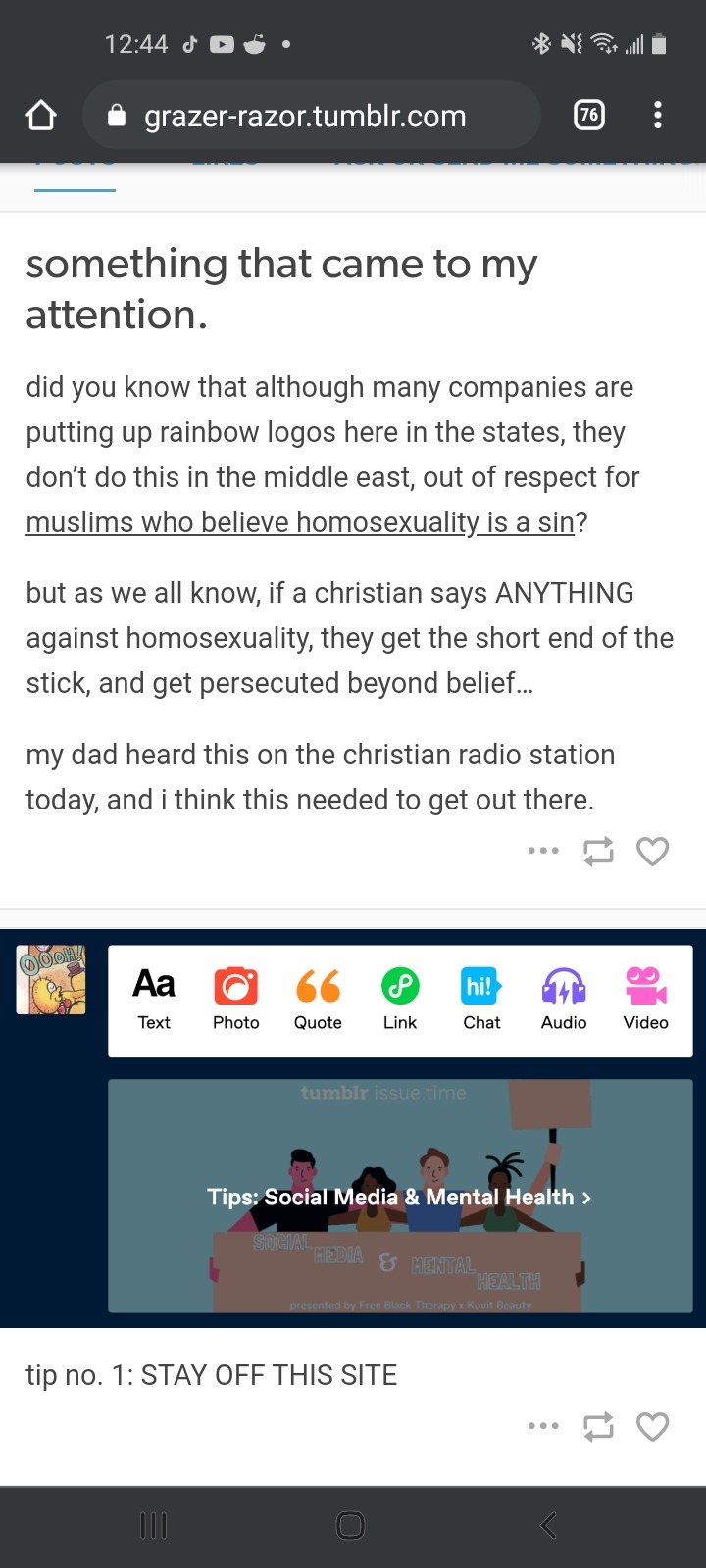
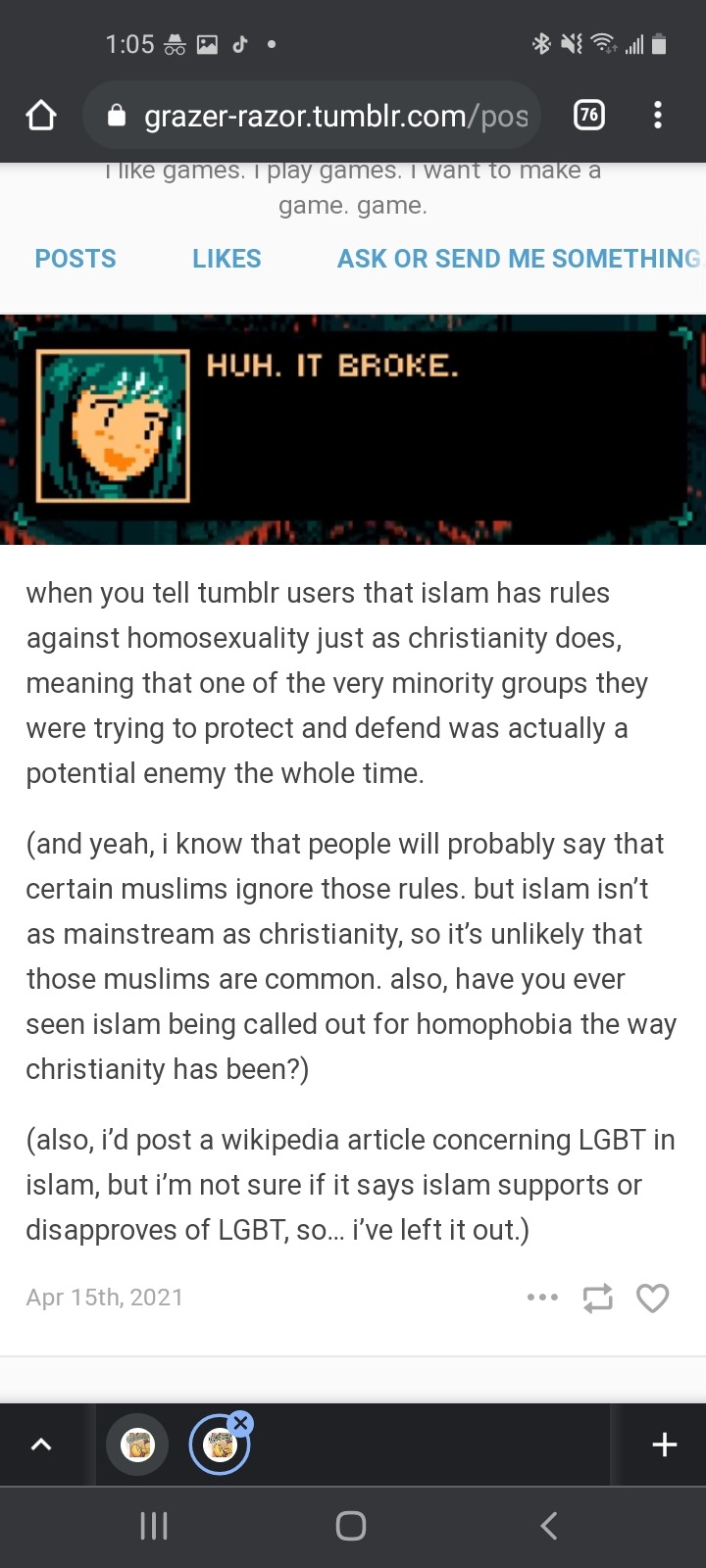
Ignoring the absolute stupidity of these statements (I'm pretty sure the lack of rainbow logos is because in many middle eastern countries, homosexuality is a crime and these companies just want to make money. But I'mnot going into the nuances and implications of rainbow capitalism today.), something stood out to me.
Does Grazer... genuinely think nobody has ever criticized the Muslim faith? That we all ignore the homophobia present within the religion just because they're a minority? Correct me if I'm wrong, but I've seen even some of the most staunch leftists criticize things like their horrible treatment of homosexuality or the rampant sexism often sanctioned by radicals. Even other Muslims, especially women and lgbt+ Muslims, have been critical of these things.
It wouldn't shock me if Grazer believedthat anyone who supports Muslims believes they can do no wrong. After all, he thinks any criticism of Christianity is hatred, and dismisses any harmful things Christians do as not being "real" Christianity in a classic case of the "No True Scotsman" fallacy.
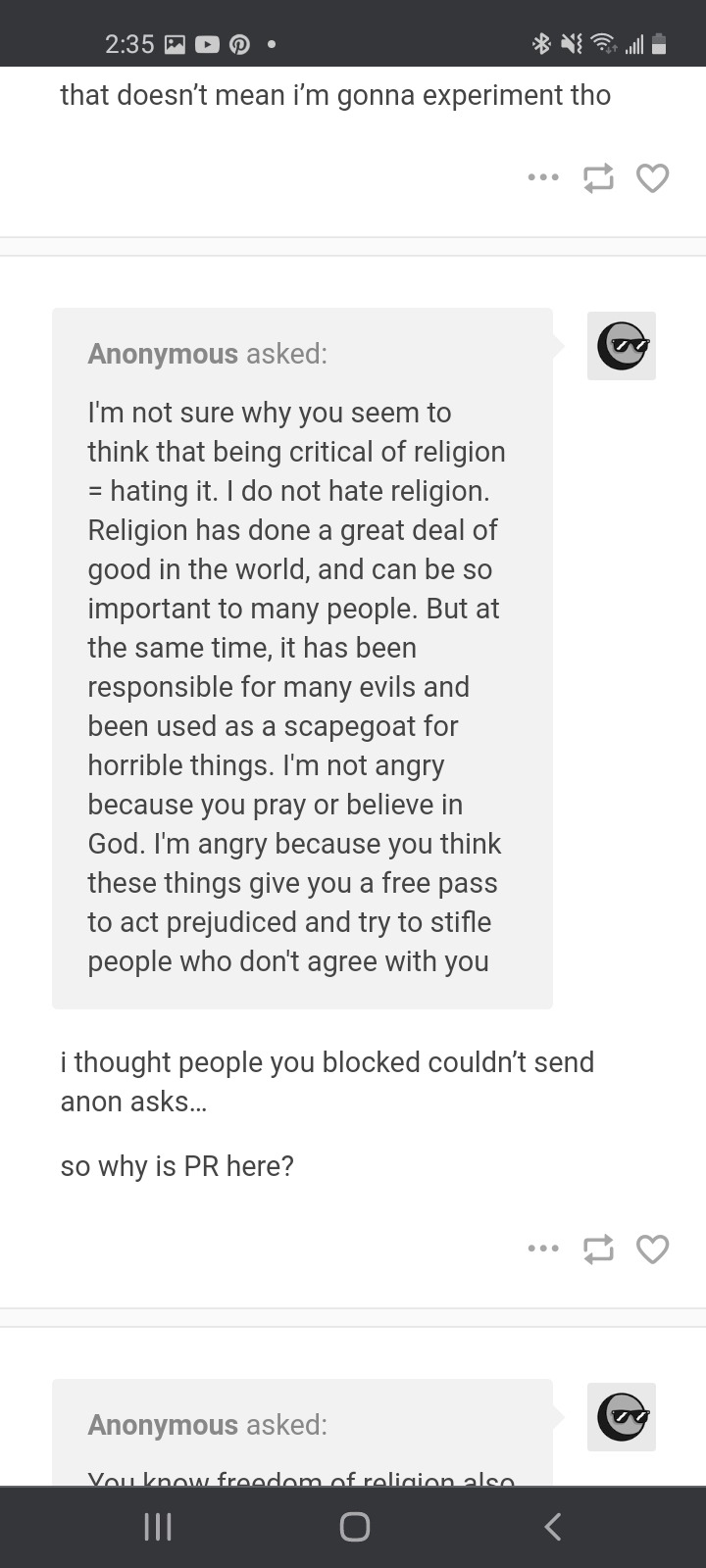
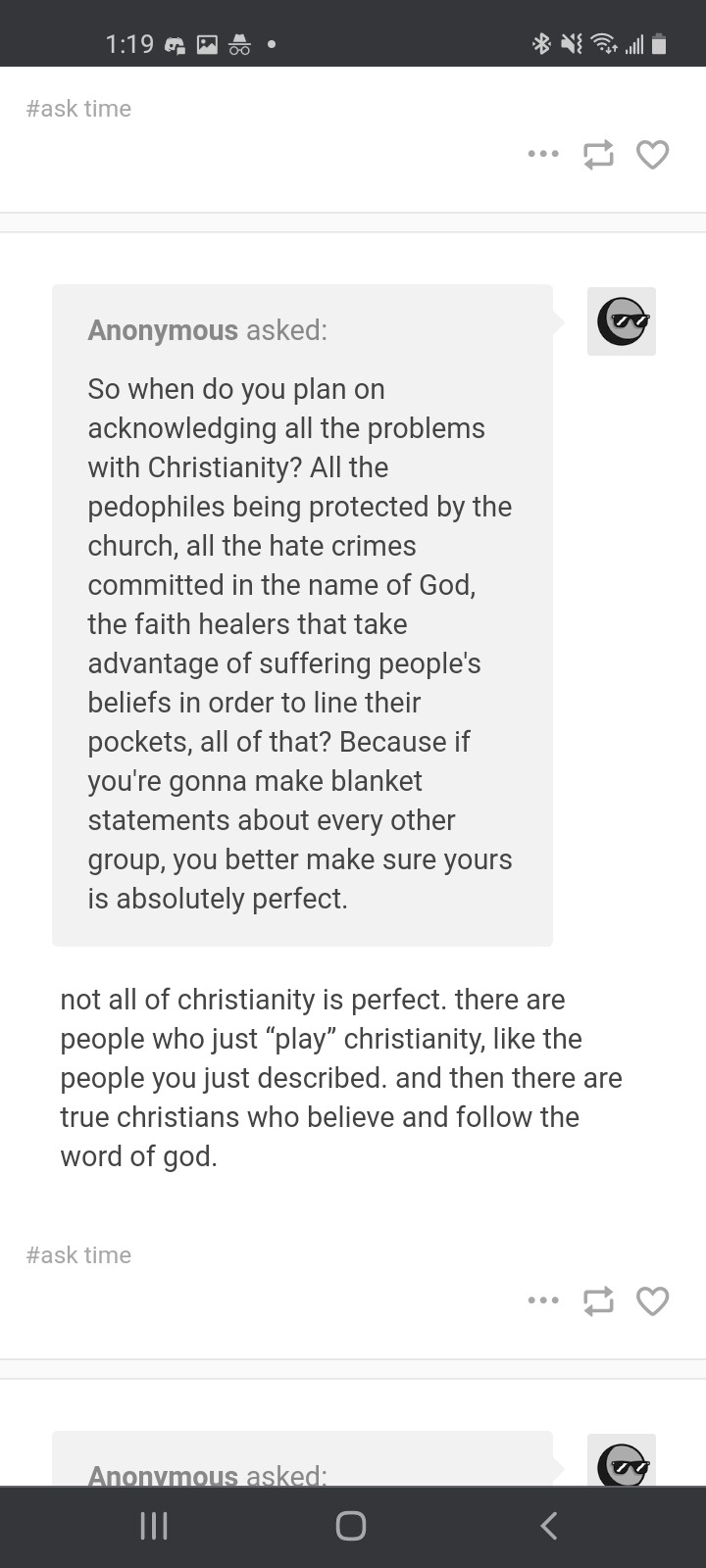
Note how he didn't even respond to the first asks comments, just accused them of being me (because obviously any time someone sees his blog it's all my fault /s)
So it seems like in Grazer's mind, there are only two options when it comes to religion: Uncritically praise and defend everything a religion does no matter how heinous it is and justify it because it's done in a God's name, or condemn anyone who practices it as hateful terrorists. Because he doesn't see people doing the former for Christians, he automatically assumes that they're doing the latter, and vice versa for Muslims.
Also note how he gets mad when muslim faith is "respected" (again, homosexuality is criminalized in many of these areas) but then demands a secular children's show cater to his religion for the sake of his precious childhood.
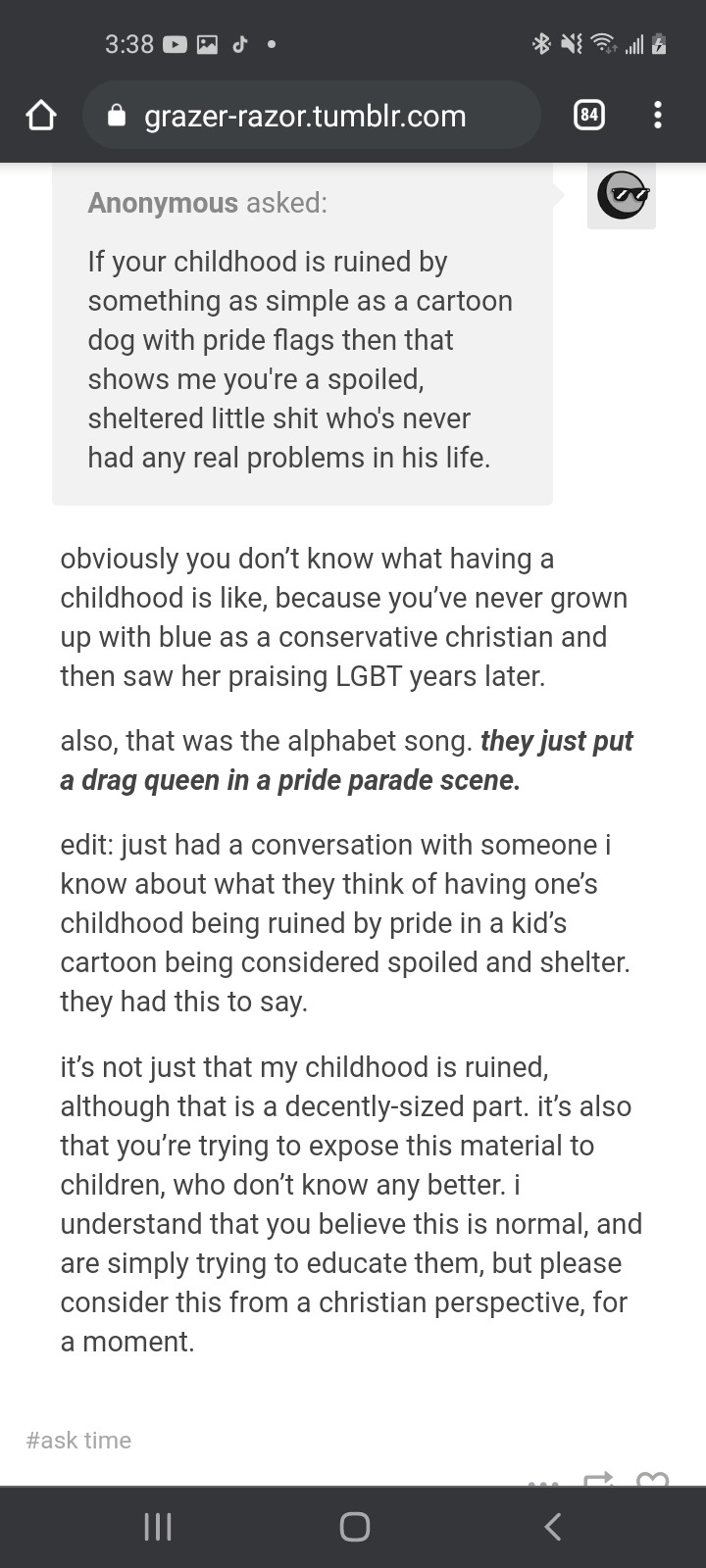
(Also, can we just talk about the absolute fucking cruelty in this answer? There are people out there that had their childhoods ruined by abuse, illness, losing loved ones, homelessness, poverty, bullying, near-death experiences, having their countries torn apart by war, a shitty foster care system, teen pregnancies, and so many other things that can absolutely destroy a life. Grazer's was ruined by… *checks notes* a cartoon character supporting gay rights and a drag queen singing a cutesy children's song. So yeah, if that's the worst part of his childhood he's pretty damn lucky, and the fact that he has the gall to still complain absolutely makes him selfish and ignorant. It's disrespectful, plain and simple, and if he were truly a good Christian he'd have some compassion.)
Okay, so Grazer has some weird "rules for me but not for thee" shit when it comes to religion. This isn't news. Where am I going with this?
Well, turns out he has this opinion about more than just religion. Know how I know this? His response to ESRB ratings and trigger warnings.
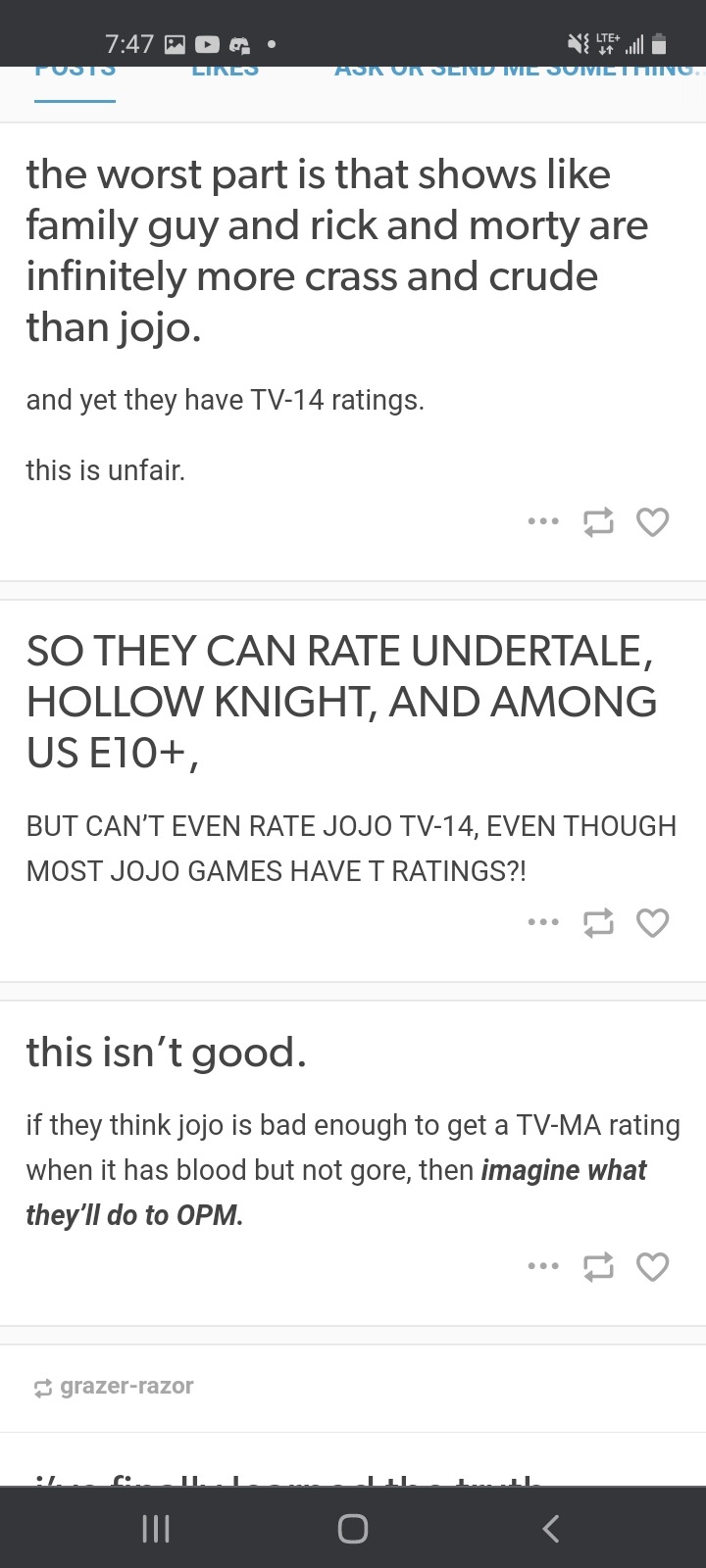
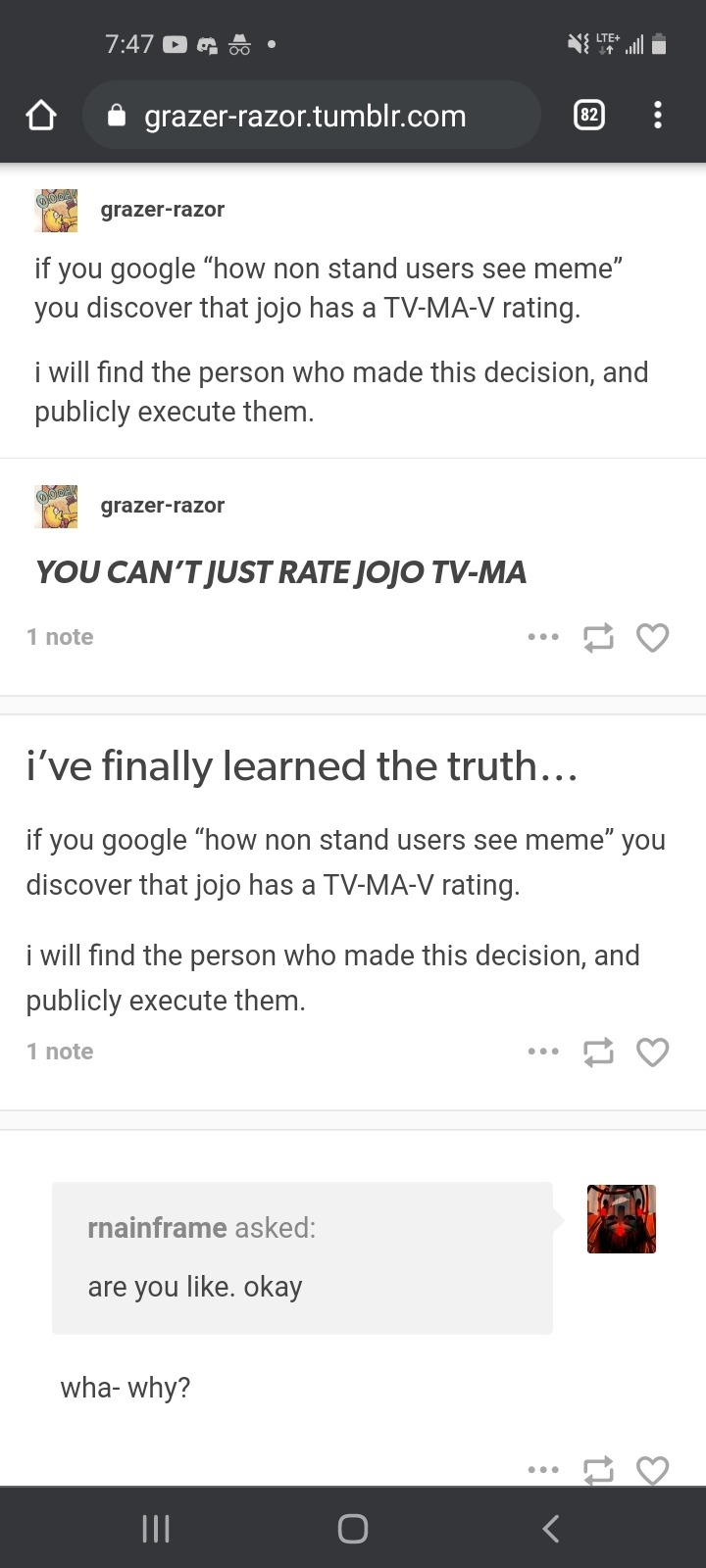
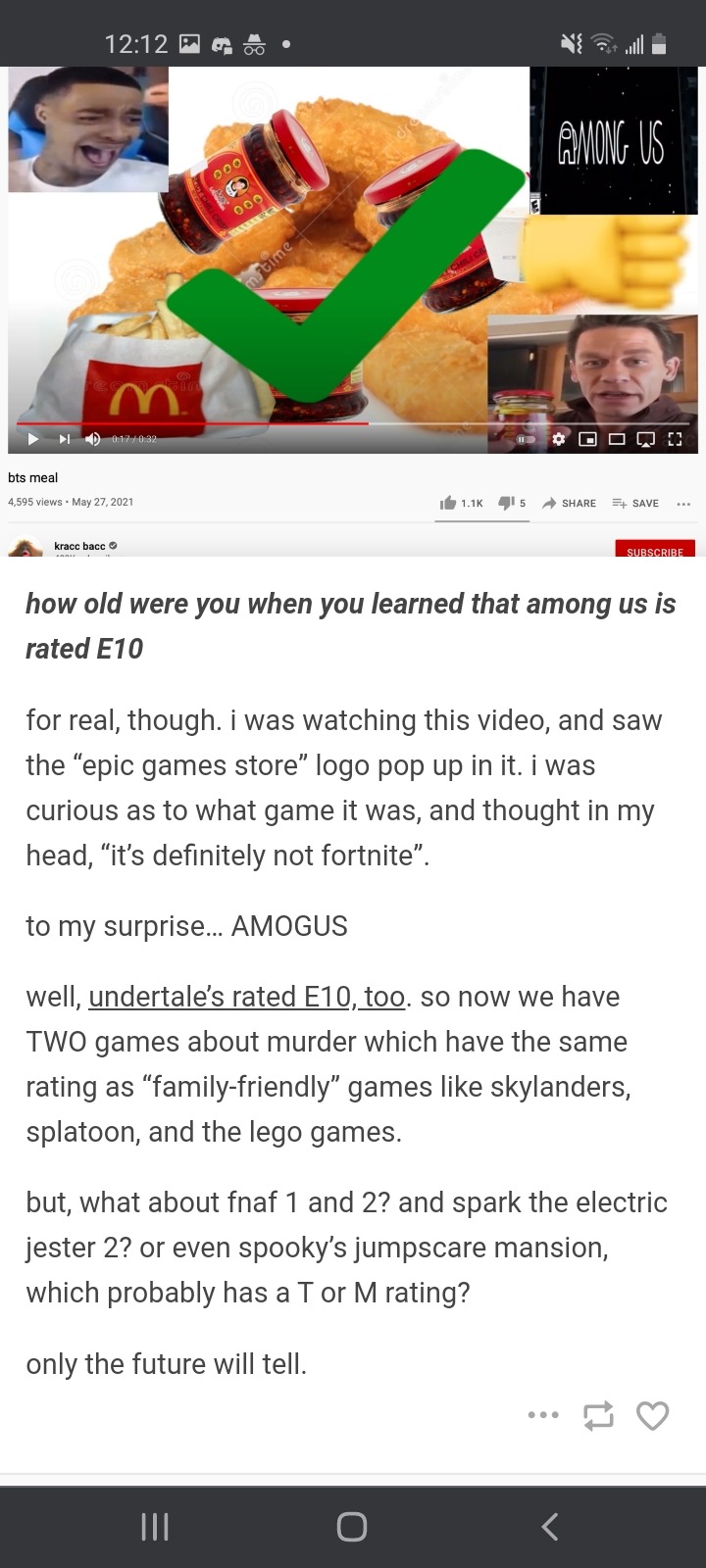

So it seems like Grazer sees the ESRB as some sort of moral compass, in a way. Something being rated E or E10 means it's pure and good and wholly unproblematic, while anything higher means it's evil and disgusting and he can't even look at it.
This is further confirmed by this post, where he flat-out states he sees the ESRB as deeming what things are and are not morally acceptable.
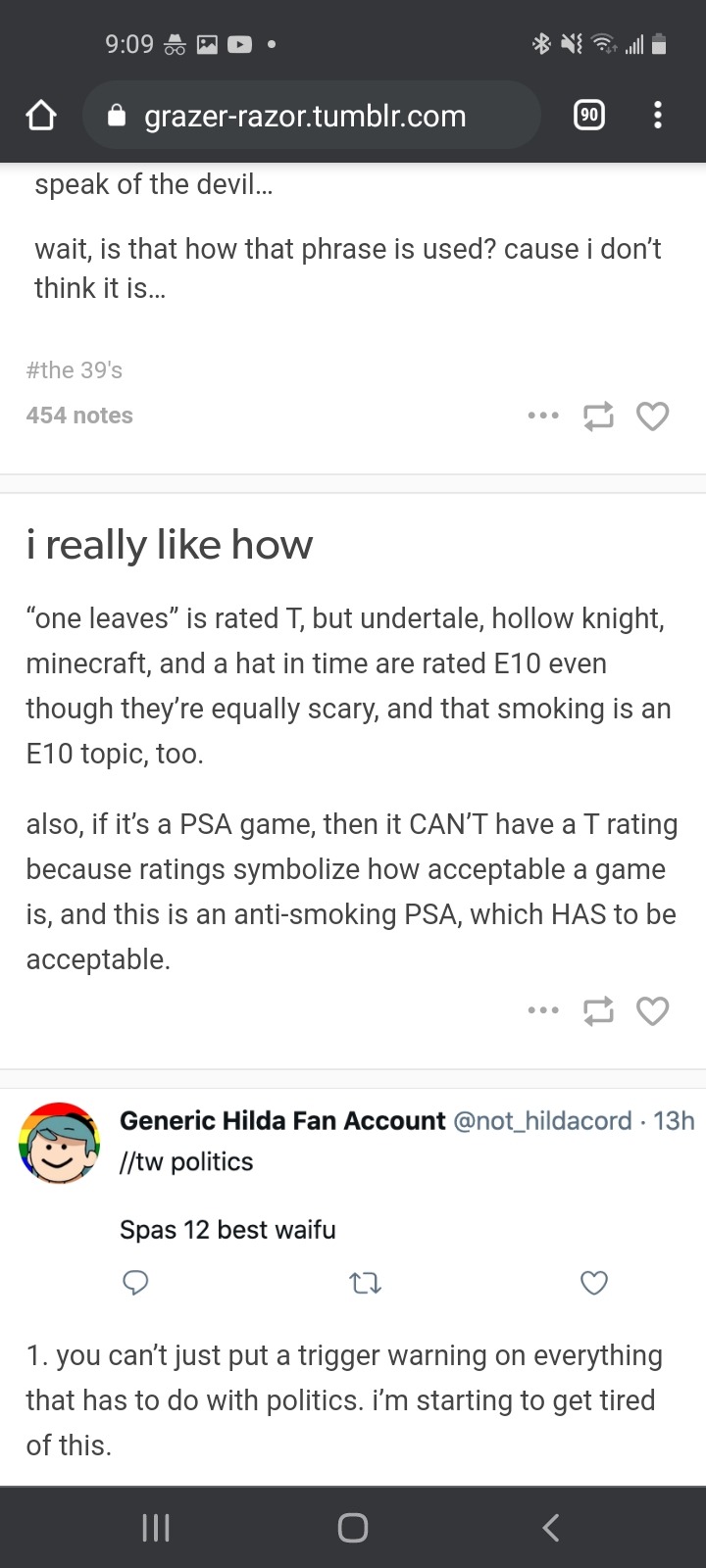
Now Grazer, I'm gonna explain this as best as I can, because it seems like you don't quite understand this. Read very carefully.
This is not the purpose of the ESRB rating system.
I repeat, this is NOT the purpose of the ESRB rating system.
The ESRB does not decide on what is and is not morally correct. It simply says "This game contains these topics, and as such is most suitable for people in this age group.". That's it. It's a guideline, not a rule.
Let's take cartoon violence, for instance. It's a very common warning the ESRB puts on games. Almost every game from Mario to Sonic to Crash Bandicoot and even Monster Tale has this warning. These games are all rated E for everyone. Does this mean those games are promoting violence to children, or claiming things like Bowser kidnapping Peach or Pinstripe trying to gun down Crash are perfectly okay and morally correct? Of course not. It's simply saying that these games contain mild, non-graphic violence, but most children should be able to handle seeing it.
On the other side of the coin, let's take a look at the warnings for nudity and sexual themes. Most games that contain these topics are rated T at the lowest and AO at the highest. This obviously isn't saying that nudity and sex are inherently bad or evil. All it's saying is that these topics are best handled by adults (And, regardless of morality, it is illegal to distribute sexual content to minors unless it's meant to be educational, like a health class textbook).
A few extra points:
. Games can be rated different things in different countries. Different countries have different regulations. Do you know why the blood in Danganronpa is pink? It's because in Japan, games with excessive amounts of blood and gore are given a Z rating (Japan's equivalent to an AO rating). They got around this by making the blood pink, securing the game its desired M rating. Meanwhile here in America, Mortal Kombat is allowed to show as many graphic, brutal deaths as it wants and still receive an M rating.
. ESRB ratings are not legally enforceable. I was so convinced as a 16 year old that the employees at gamestop would try to card me or something when I was picking up a copy of Bayonetta, and I was surprised when they simply rang me up in two seconds, no questions asked. It doesn't happen. For fuck's sake, one of the first games I ever played, at the tender age of four, was Soul Edge. A T rated game. The only instance ESRB ratings are legally enforced is in the case of AO ratings, as these games often contain incredibly graphic violenceor sexual content. If this outrage is coming from the idea that certain ratings will keep younger people from playing these games from a legal standpoint, don't worry. A nine year old is not gonna get arrested for playing Among Us. Just don't buy them GTA San Andreas or Leisure Suit Larry and everything will be fine.
. No two consumers are exactly alike. While one 13 year old may be perfectly fine with the jumpscares in Amnesia, another may be too scared to even go near the piano in Super Mario 64. That doesn't mean either of these games is rated incorrectly. The ESRB is there, once again, as a recommendation for the average consumer, and doesn't take individual experience into account. An individual experience is not their responsibility. It's also on parents (or you yourself!) To decide what the consumer can or can't handle.
"But Haley," I hear you say, "What if this piece of media DOES contain something morally bad?"
Well it's simple. You are allowed to like things AND still criticize the bad parts of it.
Hold on now, I'm not telling you that it's perfectly alright to enjoy things like Birth of a Nation or anything like that! Contrary to popular belief, there are some pieces of media that are truly too steeped in hatred and morally reprehensible things to be supported, even through a critical lense. The only merit things like that have is to serve as a warning: This is a terrible thing made for terrible reasons, and we should not allow it to happen again.
But outside of those rare circumstances, it's not so cut and dry.
Let's take a piece of media i actually enjoy, for instance, so you know I'm not a hypocrite: Persona 5.
Persona 5 is easily one of my favorite games in the Persona series. It does a lot of interesting stuff, the artstyle and soundtrack are (in my opinion) the best in the series, and overall it's very enjoyable for me.
But, like anything, it's not perfect. I'm incredibly uncomfortable with the hypocrisy the game has in regards to the sexualization of teenagers. While Kamoshida is rightfully condemned for his sexualization of teenage girls and Ann's persona awakening comes from rejecting this objectification, the game and story undermine it by not only putting Ann in a sexually revealing outfit, but also making light of Ryuji's sexual harassment by adult men (Allegedly Persona 5 Royal tries to fix this by making the men drag enthusiasts who think Ryuji would look good in drag and giving them more sympathetic personalities, but it's still really weird and hypocritical of the game to do this.). The teenage protagonist is also allowed the option to date adult women, including his teacher, and the game rarely if ever touches on the problems with this.
The game's homophobia also left a bad taste in my mouth. Aside from the aforementioned men who sexually harass Ryuji, the only other canon LGBT+ character is a bar owner who is either a drag queen or a trans woman (or both?). Sure, she's portrayed as being kind and protective of the protagonist, but there isn't much room to interact with her or learn more about her. On top of that, not only can the protagonist not romantically pursue his male friends (A feature that even the SECOND persona game had), he's not even allowed to give them gifts or platonically show affection towards them without the dialogue mocking him. The game that allows a teenage boy to date his teacher won't allow him to simply give his male friends a present.
And yet, despite those criticisms, I do still enjoy the game. I don't consider the game irredeemable garbage based on those poorly handled topics alone. And I also understand that for some people, those topics make them so uncomfortable that they don't want to play the game at all, and I completely respect that.
Criticizing the things you enjoy is not only normal, it's oftentimes healthy. Being able to step back and say "I like this thing, but I don't like the bad things it's done. This thing would be better if these issues were fixed." Sure, sometimes some people tend to complain a bit too much about the media they supposedly enjoy, but for the most part being able to acknowledge the bad with the good is a good skill to have.
Oh, wait, all of this means nothing because Grazer thinks that critically enjoying things is nothing more than an excuse to consume media he doesn't personally agree with. Okay then.
So if he can't even realize something as simple as "it's okay to criticize some parts of media that you otherwise enjoy", how can he be expected to look critically at a religion that he's been raised in and around all his life?
Soooo yeah, Grazer has some serious problems with black and white thinking that he refuses to acknowledge, further worsened by the fact that he's practically been brainwashed into believing that Christianity is the ultimate moral compass that everyone should follow. I understand that this tends to be an issue for neurodivergent people, but it's not an excuse for the actions he does that are related to these things (sending death threats to the ESRB, antagonizing others, etc.
2 notes
·
View notes